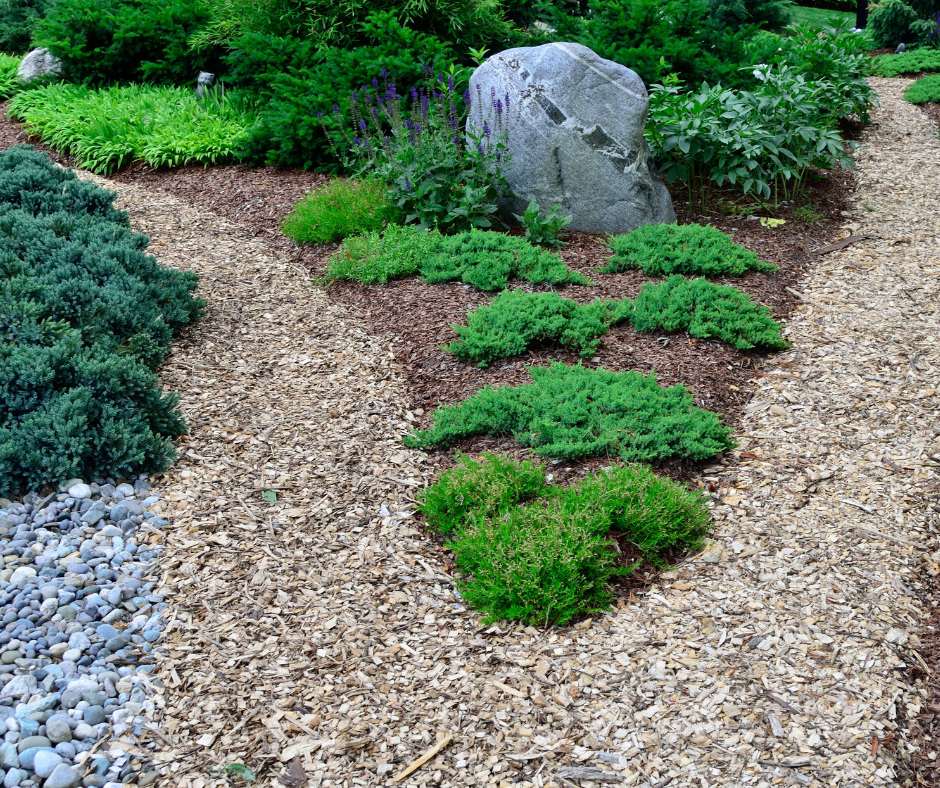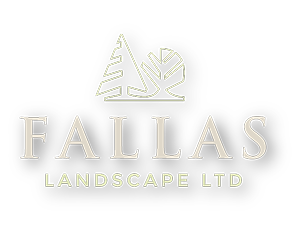 Deciding between using organic mulch, soil, or rock for your next landscaping project can be a lot trickier than it sounds. The good news is that our team at Fallas Landscape Ltd has many years of professional landscaping experience that we can use to assist you.
Deciding between using organic mulch, soil, or rock for your next landscaping project can be a lot trickier than it sounds. The good news is that our team at Fallas Landscape Ltd has many years of professional landscaping experience that we can use to assist you.
Organic mulch, rock, and plain soil are popular options for home landscaping, and each has advantages and disadvantages. Some people prefer rock because of its appearance and durability, while others prefer softer, lighter wood or pine needle mulch. Others, however, love the earthly simplicity that soil can provide. It all comes down to personal preference when choosing between soil, mulch, and rock.
Should You Use Stones or Mulch for Landscape?
Organic mulch, soil, and rock are all great options for adding a finishing touch to your landscaping. They each add vibrant colors and unique textures to your landscaping. Of course, organic mulch and rocks offer more than just aesthetic value. They both help to insulate the soil from wind and reduce temperature fluctuations, and they both help to prevent weed growth (with sufficient depth). So how does a landscaper or gardener decide which option to choose from? Even if the soil appears to be lovely and earthy, it is still a gardener’s worst enemy. Most of us know better, despite the fact that some traditional gardeners still adhere to the idea of neat, tilled rows of exposed soil.
We believe that the most important benefit of covering the soil is its ability to suppress weed growth. Weeds are despised by gardeners because they restrict the root development of your own plants and compete with them for resources. Mulch also protects all soil types by retaining moisture, slowing evaporation, and aiding in the maintenance of a consistent temperature, all of which promote plant growth. When it comes to soil horizons (the various layers that make up the soil), the topsoil should be protected. This is typically a few inches of organic soil that provides an ideal environment for plants and animals to live in. The subsoil is deeper down and richer in mineral particles and organic matter leached from the topsoil. You protect the fertile soil from erosion while also retaining all of the nutrients your plants require by covering the land surface. It is obvious that soil protection is critical. When it comes to covering your soil, you have many options: organic mulch and stone mulch are two of the most popular. We’ll assist you in determining which is best for you.
The Benefits of Mulch vs. Rock
- Less watering is needed: Mulch helps soil retain moisture and lowers surface evaporation, allowing you to water plants less frequently.
- More nutrients: Mulch is a natural product, and as it decomposes, more nutrients are added to the soil and plants.
- Fewer weeds to deal with: Mulch completely covers the soil, preventing weed growth, due to its small pieces and fine texture.
- The ideal temperature: Mulch is a natural insulator that keeps plants cool in the summer and warm in the winter. Winter mulching is especially popular among Northern gardeners.
- Easy to install: When you buy bags of mulch, you can easily transport them to the locations where you’ll spread it.
Disadvantages of Mulch
- Requires annual replacement: While mulch decay is beneficial to plants, it is detrimental to your wallet. Mulch must be replaced because it can shift in heavy rains and winds.
- Mulch can be excessive: Plants can become stressed by a mulch layer that is deeper than three inches.
- Timing is of the essence: If you apply mulch too soon, your soil will not warm naturally, resulting in late blooms. Weeds will grow if it is spread too late.
- Plant seeds and weeds: Your landscape might get new weeds after you spread organic mulch.
The Benefits of Rock vs. Mulch
- Easy to maintain: Rock does not decay and will remain in place for many years.
- It’s fireproof: Rock can be a good fire break if you live in a wildfire-prone area.
- Adds variety: Rock comes in a variety of sizes, shapes, and colors.
- Long-term cost savings: Although rock initially costs more than mulch, replacement costs are minimal to nonexistent.
- Fewer bugs to deal with: Rock won’t draw pests or bugs, which are drawn to decaying matter, like mulch will.
- Erosion resistance: On hillsides or sloped yards, rock can prevent soil erosion and stay in place.
Disadvantages of Rock
- Gets too hot: Rock that is light in color reflects heat onto plants, while rock that is dark absorbs heat and raises ground temperatures. Both cause evaporation to increase, requiring more watering.
- Plants receive no benefit: Rock doesn’t promote healthy soil or plant growth.
- Unstable pH: Different types of rock will raise the soil’s acidity or alkalinity in various regions of the United States.
- Weed patch: The gaps between the rocks beckon leaves, seeds, and weeds.
- Manual removal: Moving rock is dreadful work, whether for replanting or new landscaping.
- Too much weight: Gravel is heavy, difficult to transport, and unsuitable for do-it-yourself projects.
Making the Best Decision for Your Specific Requirements
In the end, we believe that mulch offers many of our clients the greatest advantages. Rock can also work for those who don’t mind having a variety of plants and want a very low-maintenance plant bed. We generally recommend both decorative rocks and mulch — but in different quantities. After all, decorative rocks and mulch are both excellent landscaping tools that work best in different, complementary situations. It all comes down to assisting our clients in making the best decision possible. Our aim as landscaping experts is to help them make the best decision so that their plant beds are successful. Consider which areas of your landscaping could benefit from a splash of color or texture before making the best decision for your yard.
Contact Fallas Landscape Ltd. if you need decorative rocks, mulch, or both installed.

